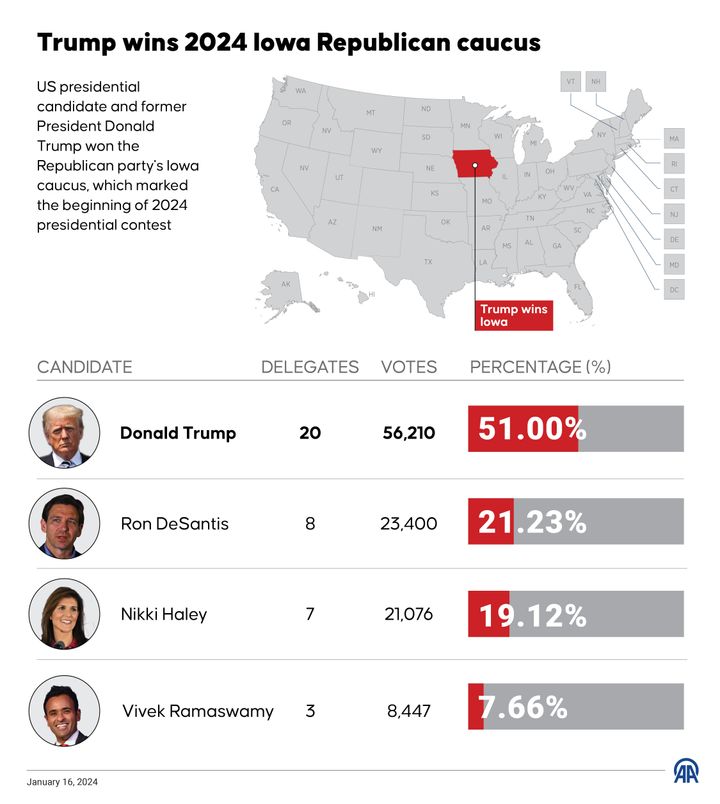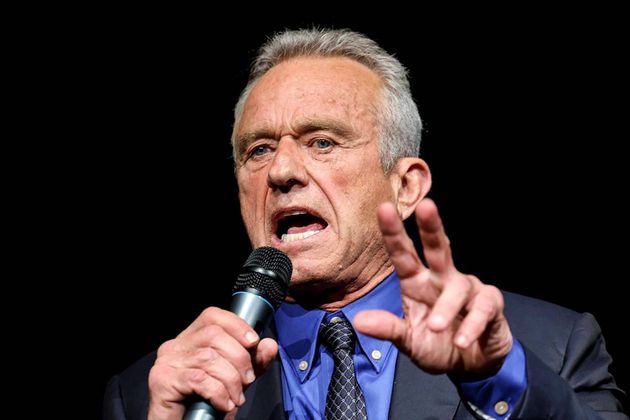Donald Trump’s sweeping victory in the Iowa caucus underlined his grip on the race to be the Republican presidential nomination in this year’s general election. But does his dominance in the first contest mean that he’s certain to be the Grand Old Party’s pick to take on Joe Biden in November?
What happened?
On a perilously-cold day in America’s Midwest, Trump secured a roughly 30-point win over his rivals – smashing the record for a contested Iowa Republican caucus with a margin of victory exceeding Bob Dole’s nearly 13-percentage-point victory in 1988. Florida governor Ron DeSantis finished a distant second, just ahead of former UN Ambassador Nikki Haley.
Advertisement
According to the entrance polls conducted by major media organisations, he won every demographic group imaginable: the college-educated and those without a degree; men and women; urban, suburban and rural voters; and evangelical Christians. The only groups he didn’t win were moderates, who went with Haley, and voters ages 17 to 29, who backed DeSantis.
But it’s only the start of a months-long campaign across all 50 US states.
At stake was Iowa’s 40 delegates to the Republican National Convention in Milwaukee this summer, with Trump’s victory meaning he secured 20 delegates. It’s minuscule in the grand scheme of outright victory – 1,215 delegates are needed to win a simple majority and the Republican standard bearer. Primary and caucus votes continue until June, meaning there’s still a long way to go. But the win hands Trump momentum going into the next battle.q

Anadolu via Getty Images
What next?
New Hampshire will hold the first-in-the-nation primary on January 23, with the Republican field likely to have thinned out by then. Conservative entrepreneur Vivek Ramaswamy suspended his campaign after a disappointing fourth place finish in Iowa and endorsed Trump.
Advertisement
Is the nomination inevitable?
There are a number of moving parts that will help determine how much to read into the Iowa result.
Trump’s main rival
The magnitude of Trump’s victory poses significant questions for both DeSantis and Haley: each took just enough of the vote to insist they were his main rival in New Hampshire, ensuring the field will remain divided against him. The picture will remain unclear until the race is whittled down to the last two.
Trump’s election track record
Questions still remain about whether Trump has enough broad appeal to beat Biden. He lost to Biden in 2020 after fuelling near-constant chaos while in the White House, culminating with his supporters carrying out a deadly attack on the US Capitol. The disappointing midterm election results in 2022 saw the majority of the candidates he endorsed defeated, and he is still broadly unpopular with the national electorate.
Court challenges
Trump is facing four separate criminal indictments The US Supreme Court is weighing whether states have the ability to block Trump from the ballot for his role in sparking the January 6, 2021, insurrection at the Capitol. And he’s facing criminal trials in Washington and Atlanta for his efforts to overturn the 2020 election. In total, he faces 91 felony charges across four criminal cases.
But Trump’s legal challenges appear to have done little damage to his reputation. Heading to court voluntarily has been a strategy designed to portray him as a victim of a politicised legal system, boosting his “anti-hero” status.
The next set of voting
New Hampshire, the next state to go to the polls, will be a tougher test. Some polling there shows Haley is within striking distance, and it is filled with the moderate, college-educated voters who are Trump’s weak point.
Advertisement


























